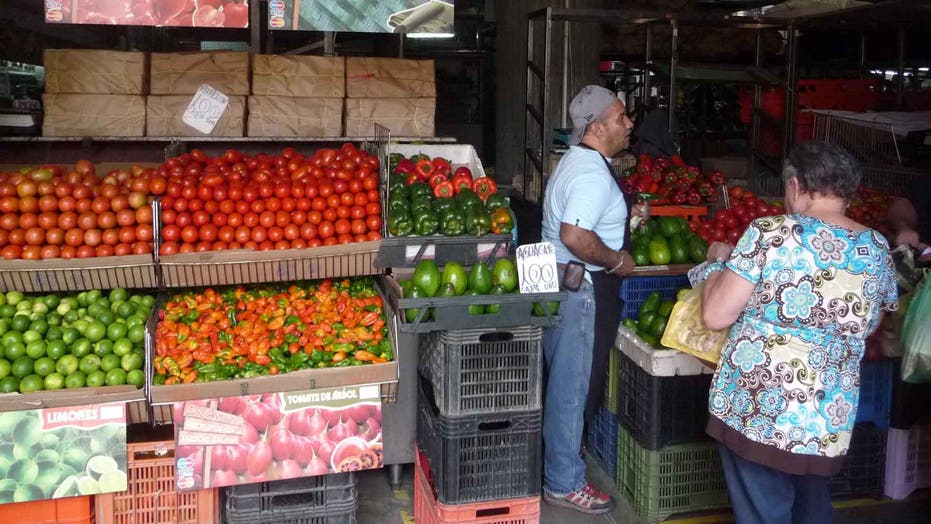Lucrezia Fanelldi is 81 years old but she won't let go of her post as a secretary in a Caracas office because her pension is not enough to cover her most basic needs.
“I just get the necessary, but things are more and more expensive each week,” she told Fox News Latino. “I used to buy fruits, but now I can’t because money is not enough. I am just buying lemons and drink them with water because I need vitamin C,” Fanelldi said in a recent afternoon while buying groceries in the Chacao food market, in eastern Caracas.
Her case is not rare in today’s Venezuela. According to a recent poll conducted by local firm Venebarometro, 81.9 percent of those surveyed said that in the last month their income couldn’t buy enough food to put on the table.
Eighty-nine said they didn’t have enough money for clothes, 81 percent said they lacked medicines, 76 percent said they couldn't afford cleaning products, 76 percent education, 72 percent transportation and 42 percent said they didn't have enough to pay for housing.
In June, the price of the basic food basket jumped 19.9 percent, from 17,833 bolivars to 21,383 bolivars – roughly $3,400 at the official exchange rate.
This increase, estimated monthly by the Labor Documentation and Analysis Center (CENDA for its acronym in Spanish), represents almost three times Venezuela’s monthly minimum wage of 7,421 bolivars.
The situation forces many to tour several food markets in search for the best prices before making a purchase.
"I live in Chacao but I try to find out what the prices are in Palo Verde, near Petare [a popular segment in the east of Caracas] to see if I can cut my food budget," Carlos Rosendo told FNL.
This works for him, he said, explaining he is spending only 2.46 percent more money every week on food, which is significantly less than the increase reported by CENDA.
The government hasn’t released any official economic data since early 2015. They blame inconsistencies found in the official metrics, but experts believe they just want to hide the economic crisis.
El Nacional newspaper reported last week, based on unidentified “government sources,” that July had seen an overall increase of 12.8 percent of the cost of living – the largest one-month increase in the country since 1989.
In the first seven months of the year inflation in Venezuela climbed 89.6 percent, according to El National sources.
“The high inflation is caused by fiscal, monetary and exchange imbalances,” Asdrúbal Oliveros, economist and director of local firm Ecoanalítica, explained to FNL. “The country’s income is stalled because the official dollar exchange rate is fixed and yet the public spending is rising, and Venezuela’s Central Bank is financing it by printing money [it doesn’t have].”
“This increases the amount of money on the street and raises prices,” he added.
Venezuelans are increasingly worried about the possibility of a hyperinflation and experts warn that the government needs to make some important decisions soon.
According to the traditional concept developed in 1956 by American economist Phillip Cagan, hyperinflation occurs when the monthly inflation rate climbs up to 50 percent or more, so the prices double in two months or less.
“Right now we are in the prelude to hyperinflation. We are showing the same symptoms of the four Latin American countries that went through it in the 1990s: Argentina, Bolivia, Peru and Brazil,” Oliveros warned.
In the 20th century hyperinflation has occurred only in 56 instances around the world, according to research by Johns Hopkins University professors Steve Hanke and Nicholas Krus.
Another factor pushing prices up is the acute shortage of all kinds of staples, from food to personal care products and auto parts.
In order to help navigate the across-the-board scarcity, Venezuelans have come up with a few creative ideas. Dayimar Ayala, a 27-year-old journalist who had a baby two years ago, is one of them. Last year she created the Twitter account @MamiEncontro (@MommyFound) for people to post the location of stores and places where they found the baby products that are hardest to find in Caracas and elsewhere.
“Being a mom is hard with these shortages,” she told FNL. “I created this account to help all the mothers like me that were going on pilgrimages to get products. This helps because people know where to go to buy medicines, diapers, or some food,” she added.
@MamiEncontro has more than 10,700 followers on Twitter.

